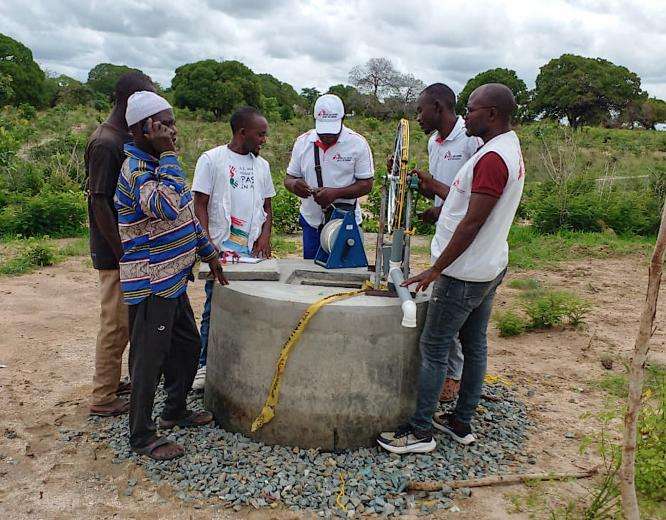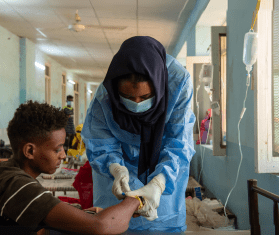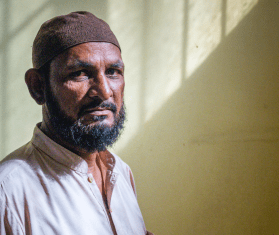MSF also advocates for expanded access to drugs, tests, and vaccines for all of our patients, regardless of their ability to pay. People needlessly get sick and die due to obstacles they face in accessing care, and our medical teams see this first-hand every day. As part of our commitment to bearing witness, MSF speaks out to reshape the medical system and develops new innovative strategies to expand access to care and save lives from preventable deaths.

Outbreaks & epidemics
What are some of the outbreaks that MSF responds to?
Cholera is a highly contagious disease that thrives in crowded, unsanitary settings without clean water—especially in poor, rural villages or refugee camps.
Cholera is a highly contagious disease that thrives in crowded, unsanitary settings without clean water—especially in poor, rural villages or refugee camps. Without treatment, it can quickly lead to death by intense dehydration due to extreme diarrhea and vomiting.
Cholera spreads through contaminated food and water supplies, so it is a particular concern in the aftermath of natural disasters that cause extreme flooding or damage water and sanitation infrastructure, such as earthquakes. Ensuring access to safe drinking water and sanitation services is a key prevention measure for stopping cholera, in addition to vaccination campaigns.
In a given year, MSF will treat tens of thousands of patients for cholera. We also run vaccination campaigns in hotspots when there is an outbreak.
Ebola is a rare but very deadly virus that can kill anywhere from 25 to 90 percent of people who become infected.
Ebola is a rare but very deadly virus that can kill anywhere from 25 to 90 percent of people who become infected. An ebola epidemic can devastate a community, as we witnessed in West Africa where the disease killed more than 11,000 people from 2014 to 2016—the largest ebola outbreak ever recorded.
Ebola is spread through the bodily fluids of an infected person and can spread quickly in health care facilities. Proper infection control, personal protective equipment, care and isolation of infected patients, and community health promotion are all key to preventing the spread of Ebola.
The disease currently has no cure, but new vaccines and treatments offer glimmers of hope for curbing future outbreaks.
A child dies of malaria every two minutes. Hundreds of thousands of people die from this parasitic disease each year, most of them children in Africa.
A child dies of malaria every two minutes. Hundreds of thousands of people die from this parasitic disease each year, most of them children in Africa.
This staggering loss of life is preventable and treatable, and MSF treated some 4,268,600 people for malaria in 2022 alone. Minutes matter when treating malaria, as the disease can become severe very quickly.
Malaria is spread by mosquitoes, which breed in water. Rainy seasons, which in many parts of the world have been lengthened or intensified by climate change, can drive increases in malaria infections. Malaria can be treated through a combination of two drugs which cure most infections in three days—but early intervention is key. Without treatment, infections can turn severe and require hospitalization or even blood transfusions.
MSF treats malaria in some of the most hard-to-reach, under-resourced places in the world. We focus on preventing the spread of the disease through spraying homes with long-lasting insecticides and antimalarial drugs.
Measles is a highly contagious virus that can be extremely deadly to children. In 2021, an estimated 128,000 people died from measles, most of them children under five.
Measles is a highly contagious virus that can be extremely deadly to children. In 2021, an estimated 128,000 people died from measles, most of them children under five. Measles is especially dangerous for children struggling with malnutrition.
MSF is working tirelessly to slow the spread of this preventable disease. Our teams vaccinated 4.1 million people against measles in 2022 amid unprecedented surges of measles cases. Outbreaks can be driven by conflict, which disrupts public health systems and routine vaccinations and forces displaced people into overcrowded camps, a perfect storm for the disease to spread.
Once a single case of measles is detected in a refugee camp, an outbreak is declared and our team springs into action. Mass vaccination is the cornerstone of our strategy to prevent measles. About 80 percent of our vaccination work is targeted at children, and we also provide measles vaccines as part of our routine pediatric care.
The cost of vaccinating one child against measles is $1, and unrestricted donations allow us to protect millions of vulnerable people against this preventable disease.
Case Studies
2022 Cholera Outbreaks | 2020 COVID-19 Pandemic | 2014 West Africa Ebola Epidemic

Mozambique: Tackling neglected tropical diseases by improving water and sanitation
MSF partners with communities to build sustainable water solutions.
people vaccinated by MSF during outbreaks in 2021
MSF patients were on highly effective HIV antiretroviral therapy in 2022
people treated for meningitis by MSF in 2022
What factors contribute to disease outbreaks and epidemics?
Millions of people die preventable deaths each year due to infectious diseases. While these diseases are directly caused by viruses, parasites, or bacteria, exacerbating factors like poverty, displacement, climate change, and lack of health care infrastructure allow infectious diseases to spread and become deadly.
These factors converge in places such as Democratic Republic of Congo (DRC) which has been enduring an ongoing measles outbreak amidst years of armed conflict. More recently, MSF has tackled cholera—a disease that can be highly contagious and deadly in areas without clean water and sanitation—after 30 countries endured outbreaks in 2022.
MSF teams are working on multiple fronts for outbreak preparedness, especially in communities vulnerable to factors like displacement, lack of infrastructure, and climate change.
MSF teams witness firsthand how forced displacement contributes to the spread of disease.
MSF teams witness firsthand how forced displacement contributes to the spread of disease. When people are forced to flee due to conflict, natural disasters, or violence, they often end up living in refugee camps or other crowded, sometimes unsanitary conditions. This provides fertile ground for infectious disease to spread, including cholera, measles, and tuberculosis.
In addition to living in crowded conditions, displaced people often lack access to clean water, sanitation, and medical care. Displaced people are also vulnerable to becoming malnourished or have weakened immune systems, making them more susceptible to contracting infections.
MSF is committed to addressing the urgent health needs of displaced people and provide them with comprehensive medical care, treatment, and vaccinations to stop the spread of infectious disease.
Lack of access to clean water and sanitation is a major contributing factor to the spread of infectious diseases in many parts of the world—particularly low-income and conflict-affected areas.
Lack of access to clean water and sanitation is a major contributing factor to the spread of infectious diseases in many parts of the world—particularly low-income and conflict-affected areas. Without safe drinking water, people are forced to use untreated water sources that can be contaminated. This creates perfect conditions for the spread of waterborne diseases like cholera and hepatitis A.
A lack of sanitation services contributes to the spread of disease as well. Without proper waste management, diarrheal diseases can spread quickly due to contamination. These diseases are a leading cause of death among children under five.
Lack of sanitation infrastructure is a major concern for forcibly displaced people who end up in overcrowded conditions like refugee camps. MSF is dedicated to addressing these critical gaps in order to prevent the spread of infectious disease, especially in crisis situations.
Years of conflict or poverty can critically damage health care infrastructure or contribute to a limited health care workforce.
Years of conflict or poverty can critically damage health care infrastructure or contribute to a limited health care workforce. These factors make it exceedingly difficult for people to access medical care, leading to delayed diagnoses, lower vaccination rates, ineffective treatments, and, ultimately, increased rates of infectious diseases.
A lack of accurate health care information is also a contributing factor. Misinformation and stigma can prevent people from seeking medical care or following through with their treatments.
In many of the countries where we operate, MSF works to rebuild health care infrastructure and support a health care workforce. Our community health promoters work to share accurate and actionable information with the communities who need it.
Comorbidities are simultaneous medical conditions that can make people more susceptible to contracting infections—or make infections more severe.
Comorbidities are simultaneous medical conditions that can make people more susceptible to contracting infections—or make infections more severe.
Comorbidities can include diabetes, malnutrition, or other underlying medical conditions, which can weaken a patient’s immune system, leading to serious complications if they contract an infectious disease. People with comorbidities often require specialized treatment, which is a challenge in countries where access to health care is limited.
MSF addresses comorbidities in a comprehensive way when it comes to preventing the spread of infectious disease. We prioritize vaccination campaigns to protect vulnerable people, particularly children, from diseases like measles.
Climate change is a global crisis that profoundly impacts public health, including the spread of infectious disease.
Climate change is a global crisis that profoundly impacts public health, including the spread of infectious disease.
A changing climate alters weather patterns, leading to extreme weather events or changing seasons that can impact the prevalence of infectious disease. For example, longer and more intense rainy seasons in many parts of the world lead to increased numbers of disease-carrying mosquitoes, fueling the spread of malaria, dengue, and Zika.
Extreme flooding can also spread waterborne diseases like cholera, which was a major concern after the historic flooding in Pakistan in 2022. Conversely, extreme drought can threaten people’s access to food, leading to malnutrition—a comorbidity that weakens the immune system, making people more susceptible to serious infection.
Many of the countries where MSF works are the most impacted by the climate emergency. We aim to respond rapidly to climate disasters and the infectious diseases spreading ever more rapidly due to climate change. At the same time, MSF has pledged to reduce the carbon footprint of our operations.
What is MSF's strategy for preventing disease outbreaks?
Climate change is a global crisis that profoundly impacts public health, including the spread of infectious disease.
Health promotion entails providing people with information and advice on good health practices, treatment, and care. Our promotion activities could include talking to communities about health promotion, sharing messages through the media or online, or using stories, songs, or plays to spread important health information.
We collaborate with local health authorities to provide comprehensive treatment to patients impacted by a disease.
We collaborate with local health authorities to provide comprehensive treatment to patients impacted by a disease. We restock health facilities with lifesaving tools and medications, scale up patient care capacity, and deliver vital aid to hard-to-reach places via our mobile clinics.
We utilize a number of strategies to prevent the spread of disease. From large-scale vaccination campaigns, administering preventive medicines, and repairing sanitation infrastructure, we work on multiple fronts to stop disease in its tracks.
We utilize a number of strategies to prevent the spread of disease. From large-scale vaccination campaigns, administering preventive medicines, and repairing sanitation infrastructure, we work on multiple fronts to stop disease in its tracks.
MSF is proud that many of our interventions to stop disease outbreaks have resulted in establishing new global health best practices. We are continually working to adapt and improve our outbreak responses as new threats emerge and for each setting in which we work. For example, a recent study we conducted found that giving people a fraction of a yellow fever vaccine is effective and can help vaccinate millions more people during emergencies, prompting the World Health Organization (WHO) to update its guidelines to recommend partial doses.
Advocating for equal access to vaccines and treatments
In response to the need for better treatments, vaccines, and diagnostic tests, MSF set up its Access Campaign in 1999 to improve care for patients.
The aims of MSF's Access Campaign are to:
- Push for price cuts to medicines, vaccines, and diagnostic tests by stimulating the production of more affordable generic products.
- Act as a watchdog to ensure that corporate interests don’t win out over public health needs.
- Steer the direction of medical research toward urgently needed new drugs, vaccines, and tests that don’t exist yet or are not tailored to the needs of people in developing countries.
- Scope out, support, and monitor new models to fund medical research that respond to medical rather than corporate needs, and do not rely on charging sky high prices for the final product to pay for the research.
Help save lives. Donate now.
Help save lives in Gaza, Afghanistan, Sudan, and in 70+ countries.
How can you help MSF’s emergency response to disease outbreaks and epidemics?
Our financial independence enables us to freely evaluate medical needs, reach communities in need without restriction, and directly provide high-quality medical care. When a new outbreak is detected, we’re able to deploy the full force of our resources at a moment’s notice in order to stop a disease from spreading.
More news and stories
Learn about MSF’s journalistic roots and our commitment to bear witness and speak out about the plight of the people we treat.

Story Dec 02, 2024
The year in photos 2024: Powerful images from Gaza, Haiti, and other r...
Read moreLearn about MSF’s journalistic roots and our commitment to bear witness and speak out about the plight of the people we treat.











